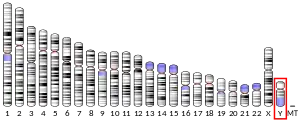BPY2
Testis-specific basic protein Y 2 also known as basic charge, Y-linked 2 is a protein that in humans is encoded by the BPY2 gene which resides on the Y chromosome.[3]
| BPY2 | |||||||||||||||||||||||||||||||||||||||||||||||||||
|---|---|---|---|---|---|---|---|---|---|---|---|---|---|---|---|---|---|---|---|---|---|---|---|---|---|---|---|---|---|---|---|---|---|---|---|---|---|---|---|---|---|---|---|---|---|---|---|---|---|---|---|
| Identifiers | |||||||||||||||||||||||||||||||||||||||||||||||||||
| Aliases | BPY2, BPY2A, VCY2, VCY2A, basic charge, Y-linked, 2, basic charge Y-linked 2 | ||||||||||||||||||||||||||||||||||||||||||||||||||
| External IDs | OMIM: 400013 GeneCards: BPY2 | ||||||||||||||||||||||||||||||||||||||||||||||||||
| |||||||||||||||||||||||||||||||||||||||||||||||||||
| |||||||||||||||||||||||||||||||||||||||||||||||||||
| |||||||||||||||||||||||||||||||||||||||||||||||||||
| |||||||||||||||||||||||||||||||||||||||||||||||||||
| Wikidata | |||||||||||||||||||||||||||||||||||||||||||||||||||
| |||||||||||||||||||||||||||||||||||||||||||||||||||
Function
This gene is located in the nonrecombining portion of the Y chromosome, and expressed specifically in testis. The encoded protein interacts with ubiquitin protein ligase E3A and may be involved in male germ cell development and male infertility. Three nearly identical copies of this gene exist on chromosome Y; two copies are part of a palindromic region. This record represents the copy outside of the palindromic region.[4]
References
- GRCh38: Ensembl release 89: ENSG00000183753 - Ensembl, May 2017
- "Human PubMed Reference:". National Center for Biotechnology Information, U.S. National Library of Medicine.
- Lahn BT, Page DC (October 1997). "Functional coherence of the human Y chromosome". Science. 278 (5338): 675–80. Bibcode:1997Sci...278..675L. doi:10.1126/science.278.5338.675. PMID 9381176.
- "Entrez Gene: RPS4Y1 ribosomal protein S4, Y-linked 1".
External links
- Human BPY2 genome location and BPY2 gene details page in the UCSC Genome Browser.
Further reading
- Repping S, van Daalen SK, Korver CM, et al. (2004). "A family of human Y chromosomes has dispersed throughout northern Eurasia despite a 1.8-Mb deletion in the azoospermia factor c region". Genomics. 83 (6): 1046–52. doi:10.1016/j.ygeno.2003.12.018. PMID 15177557.
- Tse JY, Wong EY, Cheung AN, et al. (2003). "Specific expression of VCY2 in human male germ cells and its involvement in the pathogenesis of male infertility". Biol. Reprod. 69 (3): 746–51. doi:10.1095/biolreprod.103.015792. PMID 12724276.
- Skaletsky H, Kuroda-Kawaguchi T, Minx PJ, et al. (2003). "The male-specific region of the human Y chromosome is a mosaic of discrete sequence classes". Nature. 423 (6942): 825–37. Bibcode:2003Natur.423..825S. doi:10.1038/nature01722. PMID 12815422.
- Choi J, Koh E, Suzuki H, et al. (2007). "Alu sequence variants of the BPY2 gene in proven fertile and infertile men with Sertoli cell-only phenotype". Int. J. Urol. 14 (5): 431–5. doi:10.1111/j.1442-2042.2007.01741.x. PMID 17511727. S2CID 12258681.
- Yang Y, Ma M, Li L, et al. (2009). "Differential effect of specific gr/gr deletion subtypes on spermatogenesis in the Chinese Han population". International Journal of Andrology. 33 (5): 745–54. doi:10.1111/j.1365-2605.2009.01015.x. PMID 20039973.
- Wong EY, Tse JY, Yao KM, et al. (2004). "Identification and characterization of human VCY2-interacting protein: VCY2IP-1, a microtubule-associated protein-like protein". Biol. Reprod. 70 (3): 775–84. doi:10.1095/biolreprod.103.018531. PMID 14627543.
- Wong EY, Tse JY, Yao KM, et al. (2002). "VCY2 protein interacts with the HECT domain of ubiquitin-protein ligase E3A". Biochem. Biophys. Res. Commun. 296 (5): 1104–11. doi:10.1016/S0006-291X(02)02040-5. PMID 12207887.
This article incorporates text from the United States National Library of Medicine, which is in the public domain.
This article is issued from Wikipedia. The text is licensed under Creative Commons - Attribution - Sharealike. Additional terms may apply for the media files.

